More than a year and a half ago, Americans United began planning for a new event called the National Advocacy Summit (NAS). The idea was to bring church-state separation activists to Washington, D.C., for two days of training and education about effective advocacy so they could make a difference in their communities.
The coronavirus pandemic made the original plan for an in-person gathering impossible, so Americans United retooled the Summit and launched it as an online event. While the face-to-face component was missing, going virtual had certain advantages – since no travel was involved, a lot more people could attend the NAS.
On the first day of the event, Sept. 14, nearly 800 people nationwide had registered and were ready to go. AU had planned for 150 attendees at an in-person event, and the increased numbers were a happy surprise.
“We were disappointed that we couldn’t meet in person, but we decided not to just stew over that,” said Sarah Gillooly, AU’s vice president for state outreach and engagement, who organized the Summit. “Moving online was the perfect solution because it got even more people involved.”
The two-day event featured panel discussions, speeches, lobbying visits with members of Congress, a Day of Action rally and entertainment. A summary of the event follows. It can also be viewed online at www.au. org/conference.
Opening Session: “At the Intersection of Justice”
Gillooly moderated this kickoff panel featuring three speakers: Hilary Shelton, senior vice president for advocacy and policy for the NAACP; Scott Simpson, public advocacy director for Muslim Advocates; and Mara Keisling, executive director of the National Center for Transgender Equality.
The purpose of the panel, Gillooly said, was to expose the connections between church-state separation and social justice issues. She began by noting that the Trump administration has taken several adverse actions against members of the transgender community and asked Keisling to explain why Trump has a special animus against members of the group.
Keisling replied that Trump “simply does not care about people.” She opined that Trump may not personally dislike transgender people but that he has littered his administration with far-right ideologues who have implemented anti-trans policies.
“They’ve handed domestic policy over to the right-wing extremist groups that are there specifically to leverage religion and use it as a sword” against LGBTQ people, Keisling said.
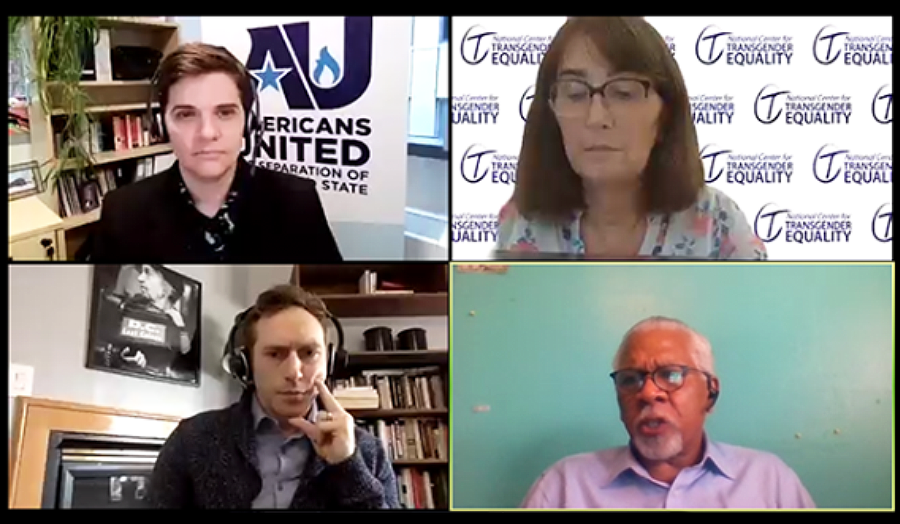
Muslims are another group that has felt Trump’s wrath. Simpson said American Muslims “are having their religious freedom and basic identity challenged at almost every juncture.”
Simpson noted that thanks to Trump’s Muslim Ban, many American Muslim families are separated from their loved ones. Other Muslims must deal with issues such as discrimination in the workplace, zoning problems and immigration matters.
“It’s one indignity after another,” Simpson said. He noted that some Trump allies go so far to insist that Islam is not a religion but a political ideology. Their goal, he said, is to strip Muslims of the religious freedom rights they are entitled to under the First Amendment.
Gillooly asked Shelton to discuss Trump policies that target the rights of Black people, especially the administration’s relentless push for private school vouchers.
Shelton provided important context, reminding Summit attendees that vouchers were first used in Southern states in the 1950s as a way to avoid court-mandated integration of public education.
“Vouchers are a tool that have an awful history of discrimination to maintain segregation in our public schools,” Shelton said. Whites-only private schools, he pointed out, were segregationist academies, and they were propped up by vouchers in many Southern states. The result was a loss of resources for public schools.
Gillooly also asked the panelists to discuss the idea of “the moral fusion movement.” This term, popularized by the Rev. Dr. William Barber II, envisions merging various social justice movements into a united front.
Shelton said the idea isn’t new and pointed out that it has been happening in the civil rights community for a long time.
“We find ourselves fighting for the same thing even if we come on different boats, in different ways,” Shelton said. He noted that most people want to live in safe communities and send their children to good schools and that Americans can rally around the Constitution’s promise of equal protection for all.
As the panel concluded, AU President and CEO Rachel Laser asked each panelist to reflect on how the issue they work on connects to church-state separation.
Keisling said she finds the metaphor of religious freedom as a shield and not a sword helpful, while Shelton noted that “separation of church and state is crucially important to preserve. The last thing we want is a theocracy.” He pointed out that such a system would be based on a certain interpretation of ancient religious texts – an interpretation that many Americans would not agree with. Simpson told attendees that to him, church-state separation means “I can be anything I want, thank you very much, as long as I’m not harming anyone else” and said he is “allergic” to the idea of anyone trying to control his faith choices.
Gillooly then closed the panel with an observation that while America’s Founders made a promise of equality for all, they failed to extend it to everyone. The good news is they left mechanisms in place to fix their omission so that we may indeed create “a more perfect union.”
The Summit’s afternoon featured five workshops:
Workshop 1: “Do No Harm: Fighting for Religious Freedom for All”
This session was hosted by Maggie Garrett, AU’s vice president for public policy, and featured four speakers: Leila Abolfazli, director of federal reproductive rights at the National Women’s Law Center; Katy Joseph, director of policy and advocacy at The Interfaith Alliance; Robin Maril, associate legal director at the Human Rights Campaign; and Maggie Siddiqi, director of the Faith and Policy Initiative at the Center for American Progress.
Garrett introduced the panel by discussing how religious freedom has been distorted in recent years and used as an instrument of discrimination. She noted that a 1993 federal law, the Religious Freedom Restoration Act (RFRA), was intended to protect minority religious expression but has in recent years been twisted by the courts to open the door to religion-based discrimination. Garrett noted that pending legislation, the Do No Harm Act, would go a long way toward remedying that situation and returning RFRA to its original purpose.
“Unfortunately, religious freedom is now becoming synonymous with discrimination,” she said. “And that is why the passage of the Do No Harm Act is so important.”
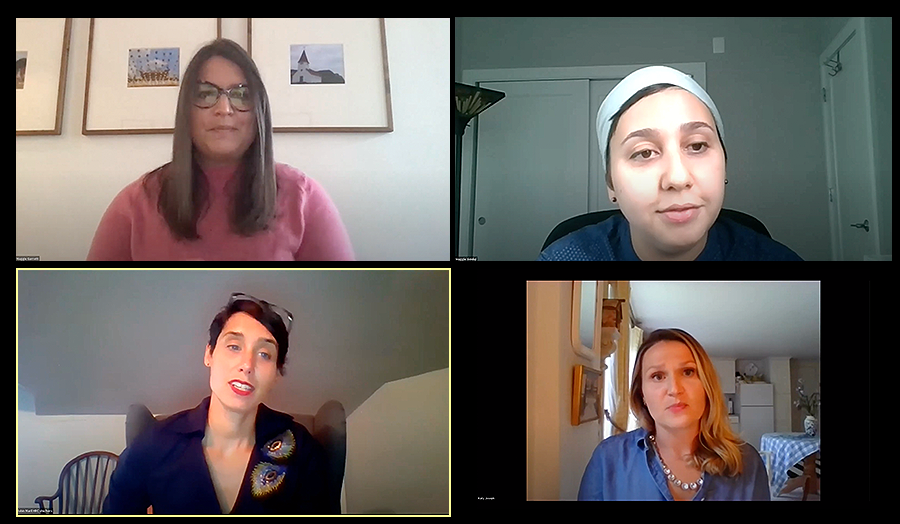
Siddiqi noted that religious accommodations are important, but they can’t be unlimited.
“If those accommodations would then violate the rights or safety of others, there is a compelling government interest in limiting those accommodations,” said Siddiqi. “What we’re talking about today is the argument that we hear from some people that their religious freedom is dependent on being able to discriminate against people of different religious beliefs … against LGBTQ people to violate their civil rights or to discriminate against people seeking reproductive health care, therefore denying their ability to access health care.”
Maril agreed and pointed out that recent efforts to redefine religious freedom as a device to discriminate are likely a backlash to the growing LGBTQ equality movement.
“As LGBTQ rights began to gain broader social acceptance, as we got marriage equality, all of a sudden, I think there was a real big effort to [say] that religious people that disagree with same-sex marriage, they are the wronged party, they are the folks facing discrimination,” she said.
Abolfazli pointed out that the most vulnerable members of society are taking the hit from the distortion of RFRA.
“Whenever you have refusals or the weaponizing of RFRA, it’s those people who are already facing barriers that are in the most harm, and we’re really seeing that across the board.”
Joseph said that RFRA had become “an exercise of power” and noted that under the way the law has been interpreted, “a religious claim supersedes personal health care decisions [and] civil rights protections.”
She added, “We’re seeing the use of taxpayer dollars, in particular, being used to implement this understanding and reinterpretation of RFRA as a means to discriminate.” This, she said, is “far beyond what RFRA was originally designed to do.”
Workshop 2: “Religious Freedom in the States: Perspectives from Local Advocates”
Hosted by Nik Nartowicz, AU’s state policy counsel, this session featured Kate Miller, advocacy director for the American Civil Liberties Union of Kentucky; Samati Niyomchai, manager of public policy for PROMO, a group that works to advance LGBTQ rights in Missouri; and Lindsay Wagner, senior writer/researcher for Public School Forum of North Carolina.
Nartowicz began the workshop by underscoring the importance of state legislatures. He noted that 156,000 bills were introduced in state legislative bodies in 2019, and 35,000 became law.
“The real action happens in state legislatures,” Nartowicz said. “Not only is that where most of the lawmaking happens, it’s also where you can have a real impact.”
Miller pointed out that most people can’t name their state legislators. That’s a shame, she said, because state lawmakers, unlike members of Congress, can be very approachable.
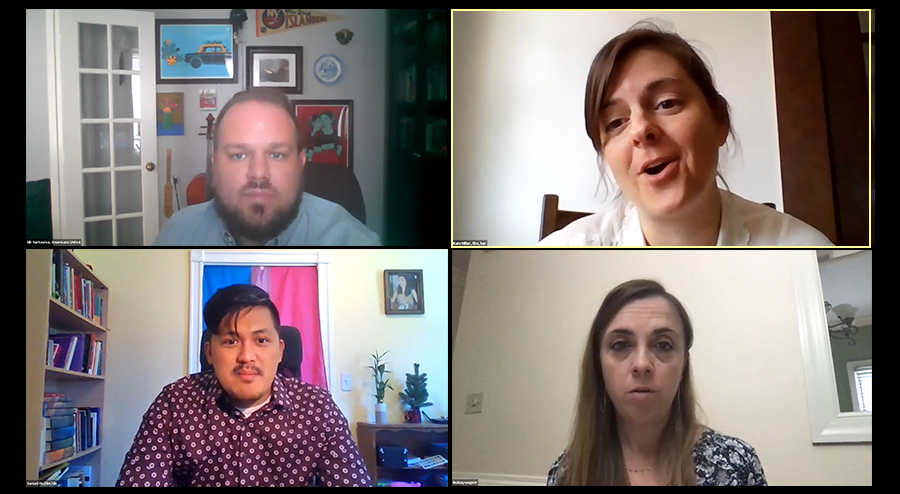
Wagner agreed, telling attendees that an informed public “can have an even bigger and better voice down at the state legislature.”
Niyomchai pointed out that citizens’ voices are crucial. A state lawmaker can turn away a professional lobbyist, he said, but isn’t likely to ignore a constituent.
“It’s incredibly important that we, in general, talk to our legislators directly, as directly as possible,” Niyomchai said, noting that emails and handwritten letters can be very effective.
Miller, Wagner and Niyomchai provided some specific examples from their respective states. Miller discussed a bill passed in Kentucky that encourages public schools to offer courses about the Bible. She said the ACLU looked into how the measure was being implemented and found some problems.
“There were definitely examples of proselytizing,” Miller said. She noted that students were urged to memorize Bible passages and build relationships with other Christian kids. Some classes relied on Sunday school materials.
In Missouri, Niyomchai said, PROMO fought a bill that allows religious, taxpayer-funded foster care agencies to discriminate against prospective parents. The measure, he said, harms those in need.
“If you say group X can’t adopt kids from our agency, that means there are more kids that are going to remain in foster care as opposed to being adopted,” Niyomchai said. “On a basic level, that’s bad.” The state, he said, is telling LGBTQ parents they aren’t good enough, a stance that is “emotionally hurtful to so many people.”
Wagner focused on vouchers in North Carolina. She noted they have little accountability, and private schools that take part in the state’s program are allowed to discriminate.
“A lot of [private religious schools] have handbooks online,” Wagner said. “You can look up their admissions policies and find that if you do not profess allegiance to or acceptance of Jesus Christ, you won’t be admitted to the school. If you are LGBTQ or even have a family member who is LGBTQ, that disqualifies you from admission to the school. A lot of times, students with disabilities are counseled out of even applying to the school because they cite that they just don’t have the resources to accommodate those students.”
Workshop 3: “The Remaking of the Courts (And Why You Should Care)”
Kenneth D. Upton Jr., senior litigation counsel at Americans United, moderated this session. Upton was joined by Heather Weaver, senior staff attorney for the American Civil Liberties Union’s Program on Freedom of Religion and Belief, and Sharon M. McGowan, chief strategy officer and legal director for Lambda Legal.
“We want to call attention to one of the more powerful tools AU and many allied organizations have – that’s the ability to go to court and to sue,” Upton said.
But, he noted, that tool is threatened because, “In recent years, many lifetime appointments to fill our federal courts have gone to judges who have demonstrated a willingness to permit some religions to wield their beliefs as a sword to cut away at the rights of others and avoid complying with laws that the rest of us must follow.”
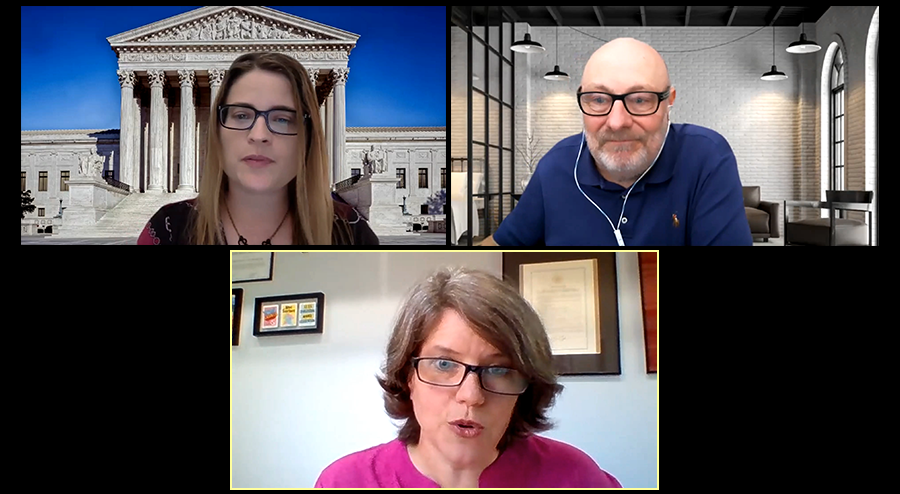
Weaver told Summit attendees the “core principles governing the separation of church and state are now at stake. … There are a number of fundamental constitutional tenets that have been well-settled are now at risk.” She outlined three key areas where Trump and his judges are eroding religious freedom: the concept that government may not favor or disfavor one faith over others; the principle that government may not directly fund religious activities; and the idea that government may not give religious accommodations if those accommodations harm others.
A fourth issue, Weaver said, is the role of religion in public education. While the erosion here has been less significant, she said, there are cases in the court pipeline that could be problematic.
“Every principle that we cherish … could be endangered,” Weaver said.
McGowan agreed. She pointed out that Trump and the Republican-controlled Senate have moved aggressively to fill judicial slots.
“This truly has been perhaps the highest priority area of this administration in terms of things that they’ve been able to accomplish,” McGowan said. “That will have lasting effects and in many ways will be playing out for generations.”
McGowan said Trump’s judicial appointees will be on the bench long after his presidency and may shape jurisprudence for 30-40 years. She also pointed out that many of the Trump appointees were vetted for very conservative views, noting that some had worked for Religious Right legal groups and others were members of the ultra-conservative Federalist Society.
Workshop 4: “Dismantling White Privilege: Race, Religious Freedom and Christian Nationalism”
This session was hosted by Sabrina E. Dent, D.Min., AU’s senior faith adviser, and moderated by Corey D.B. Walker, Ph.D., professor of humanities at Wake Forest University. The panelists were Robert P. Jones, Ph.D., CEO and founder of Public Religion Research Institute and author of the new book White Too Long: The Legacy of White Supremacy in American Christianity; Khyati Joshi, Ph.D., professor of education at Fairleigh Dickinson University and author of White Christian Privilege: The Illusion of Religious Equality in America; Amanda Tyler, executive director of the Baptist Joint Committee for Religious Liberty; and the Rev. Naomi Washington-Leapheart, professor of theology and religious studies at Villanova University.
Introducing the session, Dent declared, “In today’s session, we will explore America’s long history of proclaiming the values of religious freedom while being selective for whom this is actually granted.”
Laying the groundwork for the discussion, Walker observed, “When we begin to approach this topic, it’s made all the more challenging in a moment when we see in our everyday lives the practice of invidious forms of racial and religious intolerance and bigotry.”
Jones told attendees that white supremacy has long been entangled with American Christianity.
“They’re bound up together,” he said.
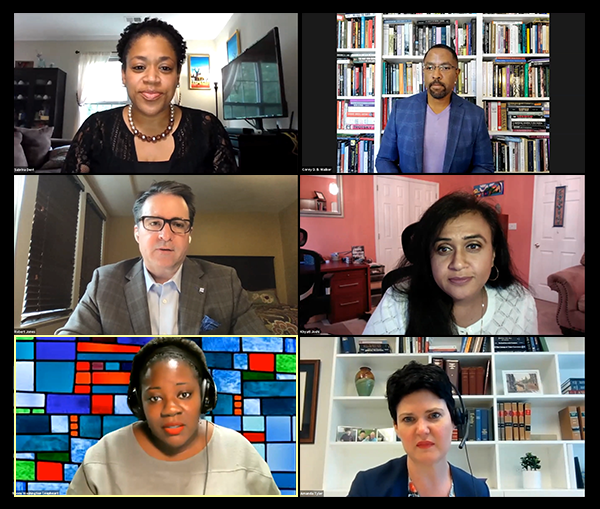
Jones added, “What it has really been about, historically, is protecting a place of privilege and power for those who could fit into this category – we even have an acronym for it: WASP, white Anglo-Saxon Protestantism. That has been the privileged category of power and the category that has been protected throughout American history.”
But Jones said America’s changing demographics have forced a reexamination of long-held power structures.
“This moment of reckoning that is upon us is a time for us to once and for all really have a real reckoning with that history and to begin to excise this sinister presence from within our democracy and within our faith,” Jones said.
Joshi pointed out that Christianity was used by whites as a justification to colonize and steal land from native people.
“We can go back to the 15th century with the papal decrees and the Doctrine of Discovery,” she said. “The Doctrine of Discovery – which stated essentially if you come upon land that is not inhabited by Christians, it’s yours for the taking – really, actually undergirds this idea of American exceptionalism, undergirds Manifest Destiny, this idea that this land is ours to take from sea to shining sea – and I say ‘our,’ but I would not have been included in that ‘our.’”
Tyler discussed Christians Against Christian Nationalism, an effort the BJC launched to combat the Christian faith being used to push dangerous forms of nationalism
“We found that this idea of Christian nationalism – a political ideology or cultural framework that really merges Christian and American identities – was really problematic, not just to our American democracy, not just to our foundational values of religious freedom for all, but also to Christians and to the integrity of the Christian religion,” Tyler said. “If we are going to salvage Christianity, then we need to call out Christian nationalism and try to disentangle these two things.”
Tyler called religious freedom for all “an antidote to the poison of Christian nationalism.”
Rounding out the session, Washington-Leapheart called for a nuanced faith-based response to white supremacy.
“I think that one resource that we have to leverage is the resource of sound theological education,” she said. “And I mean that in a formal sense and I mean that in a kind of organic, informal sense – that our faith communities themselves have to become spaces of rigorous theological wrestling, theological critique. White supremacy started first as imagined thought, and when that thought could be connected to a theological framework, once you could sanctify white supremacy, you then ensure its existence in perpetuity. And so there needs to be a sophistication in Christian communities around this transition from an idea, a concept, a value, to an ethical framework and, ultimately, a politics that is harmful.”
Workshop 5: “Fight for Your Rights in School”
The day’s final workshop was headed up by Alicia Johnson, Americans United’s student network manager. Its goal was to help high school and college students understand their rights. Johnson was joined by Mandy Caceres, executive assistant and student network associate at Americans United, and Katie Fleischer, a student at Smith College and a former AU intern.
“We are so excited to be here because we know that student activists can and do play really powerful roles in shaping their schools’ policies, in shaping movements and national conversations,” Johnson said. “We see that every day.”
Johnson noted that she speaks from experience: As a student attending a Jesuit college, she organized fellow classmates to fight for reproductive justice.
“At AU,” Johnson observed, “we are fighting for the freedom of all people to practice the religion that they want or no religion at all as long as they aren’t harming others.”
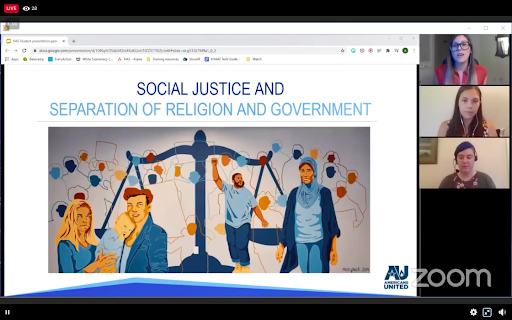
Caceres offered a rundown of students’ rights in public schools. She pointed out that public schools must offer secular coursework, noting, “Classroom instruction must be evidence-based and not influenced by personal religious beliefs.”
But Caceres explained that public schools don’t have to be religion-free zones. Religion can be discussed objectively in courses dealing with subjects like history, art and literature. In addition, she said, students have the right to pray on their own as long as there’s no compulsion.
Caceres concluded with a discussion of school vouchers, noting that because private schools are not subject to the same oversight as public schools, they often engage in discriminatory policies and infuse classwork with religion. When tax funds are awarded to these schools, it requires people to subsidize discrimination and religious instruction.
Fleischer followed up with a discussion about the rights of LGBTQ students in public schools.
“Unfortunately, LGBTQ students’ [rights] is an area where religious freedom is often used as a sword to harm others,” she said, noting that some education officials use their personal religious beliefs as an excuse to discriminate against these students.
Fleischer said state laws governing LGBTQ rights vary and that some areas of law are still being litigated in court. But other areas, she said, are settled – such as the right of public school students to form LGBTQ clubs if their schools also have clubs not related to the curriculum.
Johnson concluded the session by urging students to reach out to Americans United. The organization, she said, wants to support youth activists and has resources available specifically for them.
Evening Session: “The Secret Fundamentalism at the Heart of American Power – And How It Affects Us All”
The Rev. Neal Jones, president of AU’s Board of Trustees, opened the session by thanking attendees. He called for change and told listeners, “You are that thoughtful group of citizens who are going to change the world.”
Laser then led an enlightening conversation with Jeff Sharlet, a literary journalist and author of two books on the Fellowship Foundation (aka “The Family”), a secretive Christian nationalist organization that enjoys great influence in Washington, D.C., and abroad. (Sharlet also served as executive producer of a recent Netflix documentary series about the group.)
The Family, Sharlet explained, has interpreted the teachings of Jesus in an unusual way: They focus not on the poor and needy but the rich and powerful – politicians, business leaders and military officials. He said the group was formed in the 1930s specifically to fight the growing power of labor unions.
In 1953, Sharlet said, The Family launched the National Prayer Breakfast. Although privately sponsored, the event has become so prominent that no president dares to skip it.
“What president is going to say I’m against prayer?” Sharlet asked. “So you have to go.”
The group uses the breakfast as a recruiting tool, but Sharlet reminded Summit attendees that the event is only a small portion of The Family’s work.
Through dialogue with Laser, Sharlet explained his interest in the organization. The Family owns several properties in the D.C. suburbs of northern Virginia, and Sharlet lived in one of its houses alongside a group of young men in 2001.
“I lived amongst them and realized it was a much bigger story,” he said. He also pointed out that The Family’s style is unlike other Religious Right groups, telling attendees, “It’s not just pulpit pounders and Bible thumpers. It’s sophisticated.”
The Family, Sharlet said, operates on a philosophy of “Jesus plus nothing.” He explained that the context of Jesus’ teachings is stripped away. This allows The Family to remake Jesus in their preferred image – as a powerful white man. The group also believes in what it calls “biblical capitalism.”
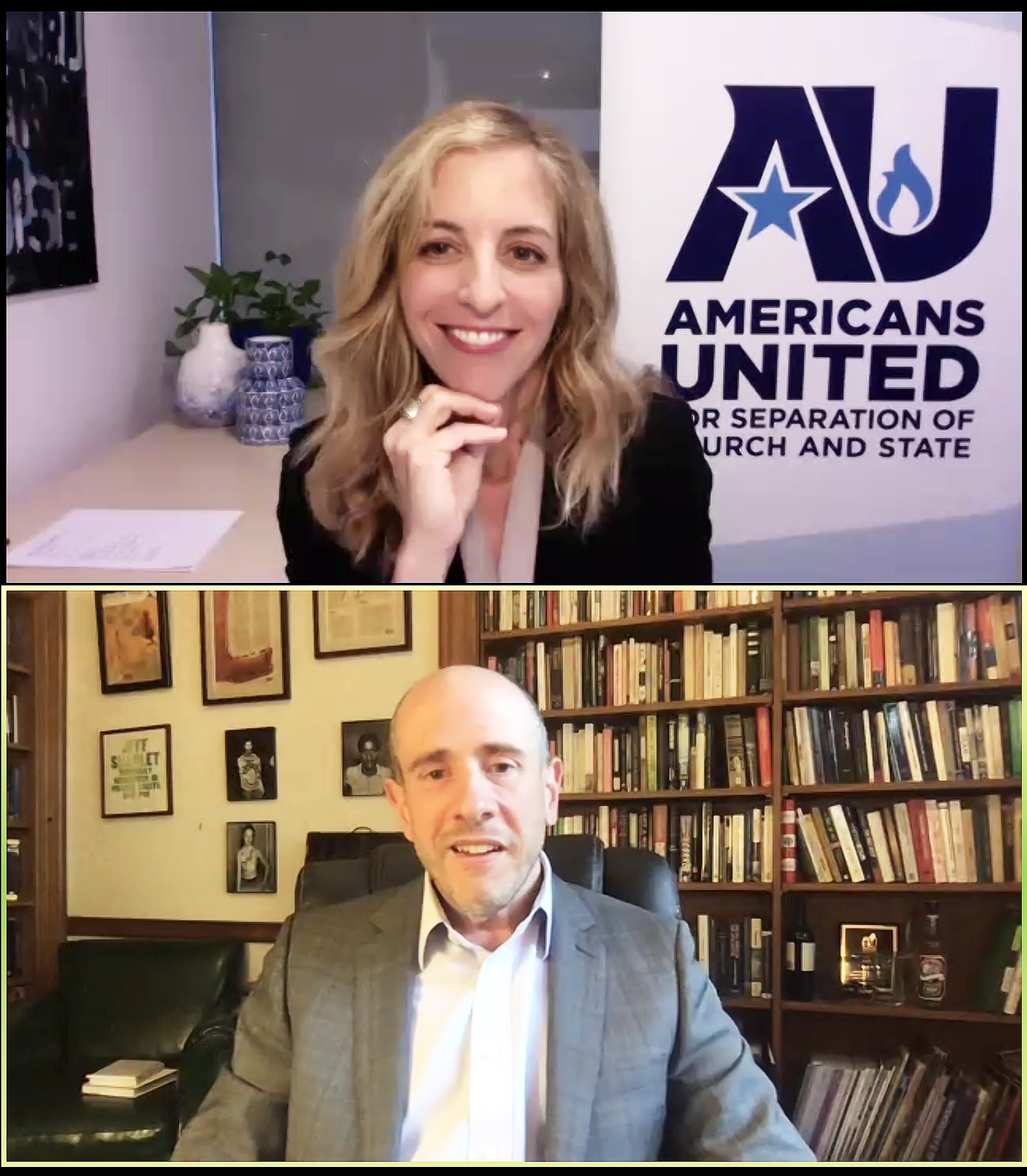
“When they look at Jesus, they see strength,” Sharlet said. “I’d argue it’s the strength of white supremacy. And that’s what they’re trying to project around the world.”
The Family, Sharlet said, is fundamentally anti-democratic. The late Doug Coe, who led the group for several decades, expressed admiration for the strength wielded by dictators like Adolf Hitler, Joseph Stalin and Pol Pot (while not necessarily endorsing their actions). In that sense, Sharlet told the online crowd, Trump is a perfect politician for The Family.
“[Trump] is a figure they are made to work with – a strongman,” Sharlet said.
The evening session featured two other special guests: Aimee Maddonna, a South Carolina mother who is the plaintiff in an Americans United-sponsored lawsuit designed to end taxpayer-funded discrimination in foster care, and singer-songwriter Scarlett Rabe, who gave a powerful 20-minute performance.
Maddonna told a heart-wrenching story about her experience trying to volunteer with Miracle Hill Ministries, a government-funded foster care agency in Greenville, S.C. She explained that her parents had been foster parents and that her family wanted to support children in the system.
All seemed to be going well, Maddonna said, until she was asked to provide a reference from her pastor. When Maddonna offered the name of her Catholic church, officials at Miracle Hill, which is evangelical Protestant in nature, told her she could not volunteer due to her religion.
“It was a complete and total shock,” Maddonna said.
Maddonna said the saddest thing about her experience is that Miracle Hill’s discriminatory policies hurt children. She pointed out that there’s a shortage of foster parents in the state and said it makes no sense to further reduce the pool by applying a religious litmus test.
“These kids don’t need to be in an institutional setting,” she said.
The evening concluded with Rabe’s inspiring performance. Between songs, Rabe told the crowd that she is motivated to support church-state separation in part due to her experiences growing up in a rigid fundamentalist Christian group.
After leaving what she called a “cult,” Rabe said, she became “a passionate advocate and fierce defender of religious freedom.” She told the crowd that she believes, “In America, we should all be treated equally, no matter who we are or who we love.”
Day Two: National Day of Action to Pass the Do No Harm Act
Laser kicked off the second day of the Summit Tuesday morning with some welcoming remarks.
“Eighteen months ago when we started planning this Summit, we couldn’t have imagined how different the world would be,” Laser said. She said she was excited “to connect and learn and make some noise about church-state separation.”
The country, Laser added, faces “unprecedented challenges” that make AU’s work all the more important. She noted that after the coronavirus outbreak, some houses of worship began demanding special treatment and exemptions from public health orders. AU responded quickly, filing legal briefs in nearly 30 pandemic-related cases.
Laser also said that AU had taken a leadership role in responding to efforts by the Trump administration to elevate fundamentalist, politicized interpretations of Christianity above other faiths.
“We’ve made it clear that President Trump’s racist actions that he cloaks in religion are nothing less than white Christian nationalism,” she said. Referring to a host of Trump actions that have eroded separation of church and state, she added, “You know why we’re here today. We’re here because we know our democracy is better than that. We know that our Constitution insists on an America where all are free to practice whatever religion we choose or no religion so long as we don’t harm others. It’s our job and our duty to push for that more perfect union.”
Concluded Laser, “To every single one of the hundreds of people joining us today, welcome and thank you so much for being with us at this urgent moment in our history. I am honored to be in this work with you.”
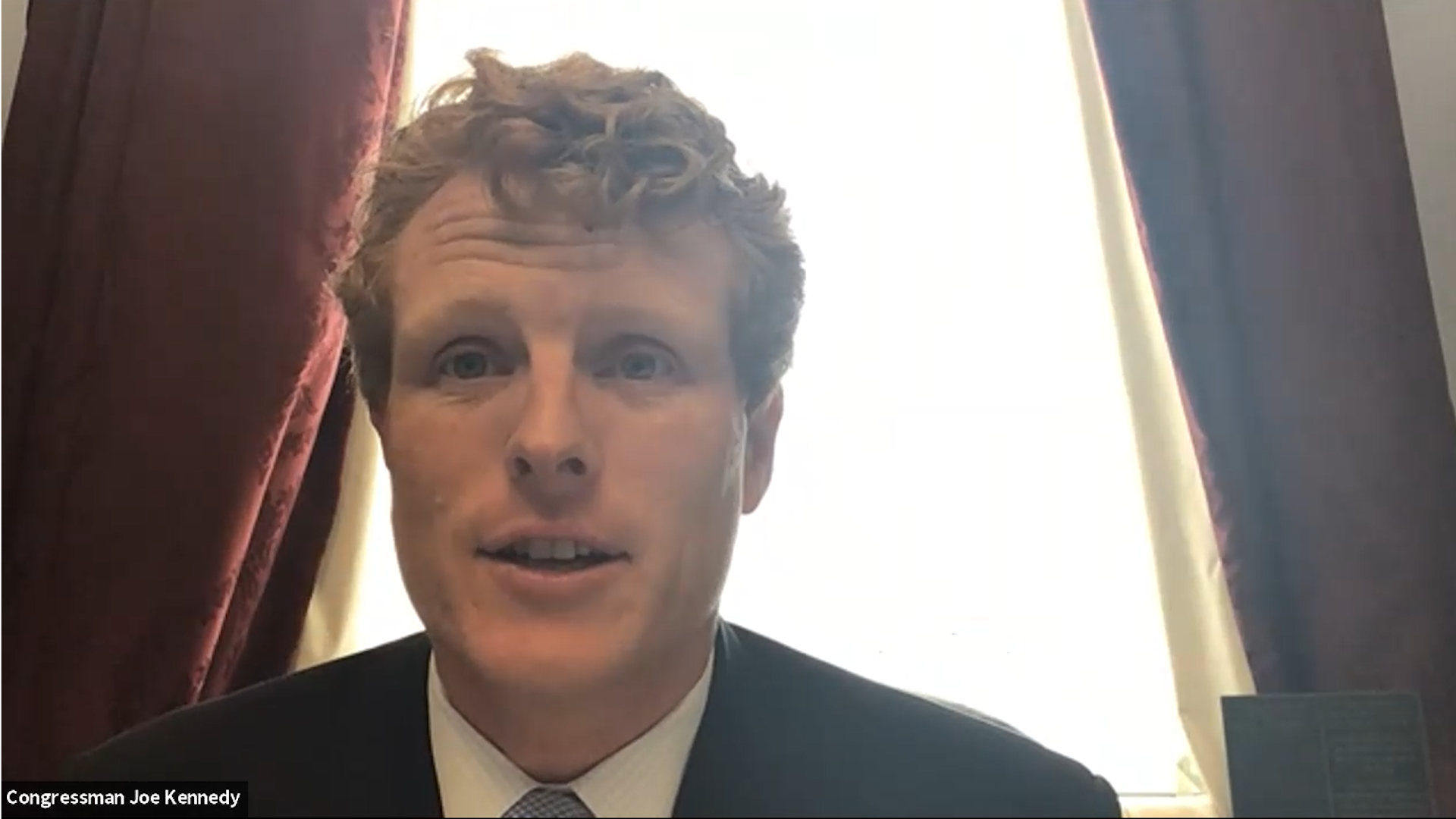
The Summit then shifted to a National Day of Action, an online event designed to urge Congress to pass the Do No Harm Act, critical legislation discussed during Monday’s session.
The Do No Harm Act will restore RFRA to its original intent by making it clear that religious freedom cannot be used to allow for discrimination or harm. The proposed legislation will protect the rights of women, LGBTQ people, religious minorities, the non-religious and others in health care, employment, access to government-funded services and in other areas of life. More than 200 members of the House of Representatives and 30 Senators are co-sponsoring the bill.
Many Summit attendees engaged in virtual visits with members of Congress and their staffs to express their support for the Do No Harm Act. Those who didn’t sign up for virtual lobbying were urged to take action in other ways, such as emailing their members of Congress to ask them to support the Do No Harm Act, posting about the bill on social media or writing a letter to the editor of their local newspaper.
Two members of Congress who introduced the act, U.S. Reps. Robert C. “Bobby” Scott (D-Va.) and Joe Kennedy (D-Mass.), spoke to attendees about why the legislation is so important.
Scott began by saluting Americans United for its “critical work to preserve religious liberty.” He cited the Virginia Statute for Religious Freedom, a bill from Scott’s home state that was written by Thomas Jefferson and that many historians consider a precursor to the First Amendment. The Virginia Statute makes it clear, Scott said, that religious freedom can’t be used to infringe on other civil rights.
But under the Trump administration, he said, RFRA has been too often used as an instrument of discrimination to the extent that people who want to discriminate because of their religious beliefs are now portraying themselves as victims.
Stated Scott, “It’s clear that Congress can no longer ignore the abuse of RFRA.”
Kennedy agreed. He also thanked AU for its work on this issue and added, “What we’ve seen over the past four years has brought a stark focus on how vulnerable basic human rights can be.”
Passing the Do No Harm Act, Kennedy said, will recalibrate RFRA and ensure that it is no longer used “as a tool of discrimination.”
During a Q&A with Laser, Scott pointed out that questions about the alleged right of secular businesses to discriminate were settled more than 50 years ago during the civil rights movement. He urged AU supporters to remain vigilant so that discrimination is not reintroduced under the guise of religious freedom.
“Discrimination anywhere is an invitation to discriminate everywhere,” he said.
And with that, AU’s members and supporters hit the ground running – virtually – to advocate for the Do No Harm Act and real religious freedom. They made AU’s first National Advocacy Summit a huge success – and it won’t be a one-time event. Look for the Summit to return in 2022. If all goes well, we might even meet in person.


